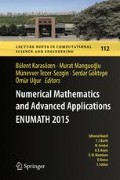Abstract
The Reduced Basis Method (RBM) (Rozza et al., Archiv Comput Methods Eng 15:229–275, 2008) generates low-order models for efficient evaluation of parametrized PDEs in many-query and real-time contexts. It can be seen as a parametric model reduction method (Benner et al., SIAM Rev 57(4):483–531, 2015), where greedy selection is combined with a projection space composed of solution snapshots. The approximation quality is certified by using rigorous error estimators. We apply the RBM to systems of Maxwell’s equations arising from electrical circuits. Using microstrip models, the input-output behaviour of the interconnect structures is approximated for a certain frequency range. Typically, an output is given by a linear functional, but in the case of impedance parameters (also called Z-parameters), the output is quadratic. An expanded formulation is used to rewrite the system to compliant form, i.e., a form, where the input and output are identical. This enables fast convergence in the approximation error and thus very low reduced model sizes. A numerical example from the microwave regime shows the advantage of this approach.
Access this chapter
Tax calculation will be finalised at checkout
Purchases are for personal use only
References
G. Rozza, D.B.P. Huynh, A.T. Patera, Reduced basis approximation and a posteriori error estimation for affinely parametrized elliptic coercive partial differential equations. Archiv. Comput. Methods Eng. 15, 229–275 (2008)
P. Benner, S. Gugercin, K. Willcox, A survey of projection-based model reduction methods for parametric dynamical systems. SIAM Rev. 57 (4), 483–531 (2015)
R. Hiptmair, Finite elements in computational electromagnetism. Acta Numer. 11, 237–339 (2002)
S. Zaglmayr, High order finite element methods for electromagnetic field computation. PhD thesis, JKU Linz (2006)
M.W. Hess, P. Benner, Fast evaluation of time-harmonic Maxwell’s equations using the reduced basis method. IEEE Trans. Microw. Theory Tech. 61 (6), 2265–2274 (2013)
M.W. Hess, P. Benner, A reduced basis method for microwave semiconductor devices with geometric variations. COMPEL Int. J. Comput. Math. Electr. Electr. Eng. 33 (4), 1071–1081 (2014)
J.S. Hesthaven, G. Rozza, B. Stamm, Certified Reduced Basis Methods for Parametrized Partial Differential Equations (Springer, Cham, 2016)
M.W. Hess, S. Grundel, P. Benner, estimating the inf-sup constant in reduced basis methods for time-harmonic Maxwell’s equations. IEEE Trans. Microw. Theory Tech. 63 (11), 3549–3557 (2015)
S. Sen, Reduced basis approximation and a posteriori error estimation for non-coercive elliptic problems: application to acoustics. PhD thesis, Massachusetts Institute of Technology (2007)
Acknowledgements
The model used for the numerical experiment is available through the MOR Wiki found under www.modelreduction.org. This work is supported by the collaborative project nanoCOPS, Nanoelectronic Coupled Problems Solutions, supported by the European Union in the FP7-ICT-2013-11 Program under Grant Agreement Number 619166.
Author information
Authors and Affiliations
Corresponding author
Editor information
Editors and Affiliations
Rights and permissions
Copyright information
© 2016 Springer International Publishing Switzerland
About this paper
Cite this paper
Hess, M.W., Benner, P. (2016). Output Error Estimates in Reduced Basis Methods for Time-Harmonic Maxwell’s Equations. In: Karasözen, B., Manguoğlu, M., Tezer-Sezgin, M., Göktepe, S., Uğur, Ö. (eds) Numerical Mathematics and Advanced Applications ENUMATH 2015. Lecture Notes in Computational Science and Engineering, vol 112. Springer, Cham. https://doi.org/10.1007/978-3-319-39929-4_33
Download citation
DOI: https://doi.org/10.1007/978-3-319-39929-4_33
Published:
Publisher Name: Springer, Cham
Print ISBN: 978-3-319-39927-0
Online ISBN: 978-3-319-39929-4
eBook Packages: Mathematics and StatisticsMathematics and Statistics (R0)

